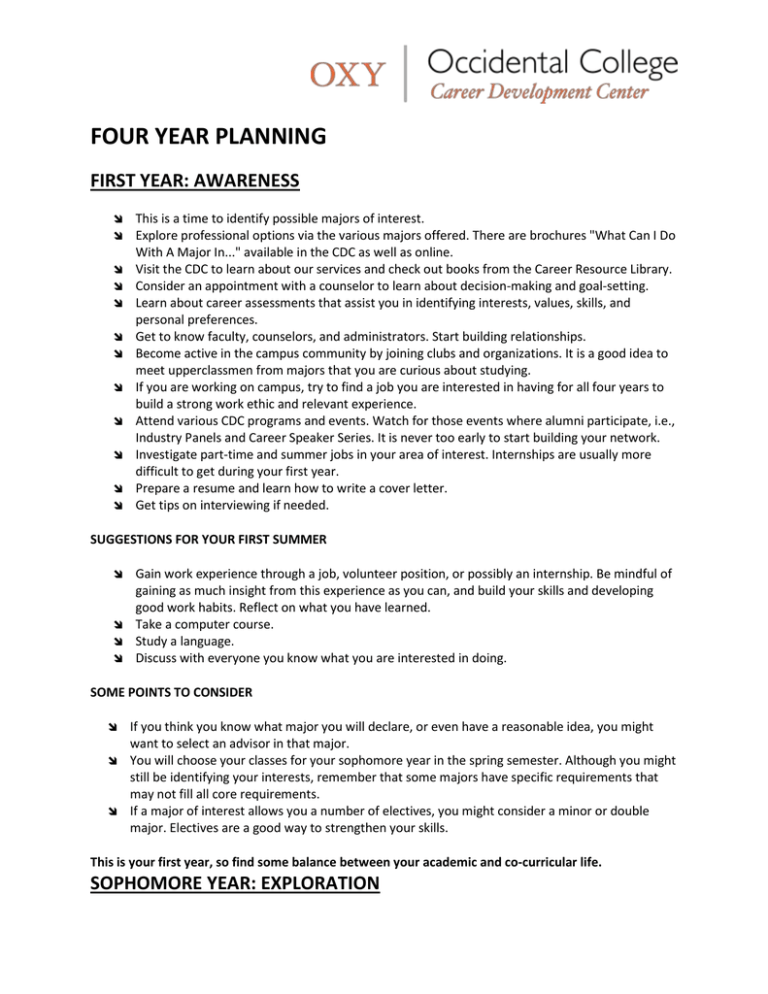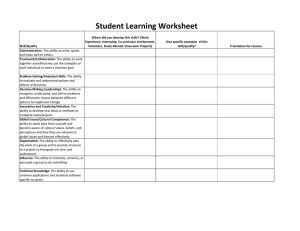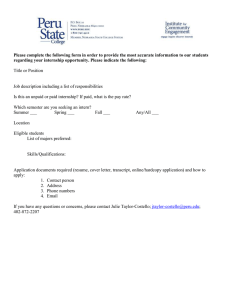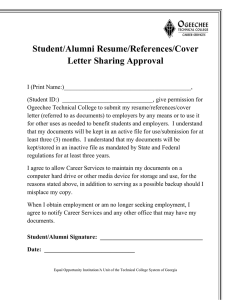FOUR YEAR PLANNING FIRST YEAR: AWARENESS
advertisement

FOUR YEAR PLANNING FIRST YEAR: AWARENESS This is a time to identify possible majors of interest. Explore professional options via the various majors offered. There are brochures "What Can I Do With A Major In..." available in the CDC as well as online. Visit the CDC to learn about our services and check out books from the Career Resource Library. Consider an appointment with a counselor to learn about decision-making and goal-setting. Learn about career assessments that assist you in identifying interests, values, skills, and personal preferences. Get to know faculty, counselors, and administrators. Start building relationships. Become active in the campus community by joining clubs and organizations. It is a good idea to meet upperclassmen from majors that you are curious about studying. If you are working on campus, try to find a job you are interested in having for all four years to build a strong work ethic and relevant experience. Attend various CDC programs and events. Watch for those events where alumni participate, i.e., Industry Panels and Career Speaker Series. It is never too early to start building your network. Investigate part-time and summer jobs in your area of interest. Internships are usually more difficult to get during your first year. Prepare a resume and learn how to write a cover letter. Get tips on interviewing if needed. SUGGESTIONS FOR YOUR FIRST SUMMER Gain work experience through a job, volunteer position, or possibly an internship. Be mindful of gaining as much insight from this experience as you can, and build your skills and developing good work habits. Reflect on what you have learned. Take a computer course. Study a language. Discuss with everyone you know what you are interested in doing. SOME POINTS TO CONSIDER If you think you know what major you will declare, or even have a reasonable idea, you might want to select an advisor in that major. You will choose your classes for your sophomore year in the spring semester. Although you might still be identifying your interests, remember that some majors have specific requirements that may not fill all core requirements. If a major of interest allows you a number of electives, you might consider a minor or double major. Electives are a good way to strengthen your skills. This is your first year, so find some balance between your academic and co-curricular life. SOPHOMORE YEAR: EXPLORATION If you‘ve declared a major, consider getting a part-time job or internship that relates to your field of interest or that will help you develop essential skills. Try to find a job that you might want to keep for the duration of three years that offers increasing responsibilities. This will demonstrate commitment, stability and responsibility to future employers. Register on TIGERlink and NIC, the CDC’s online database featuring internship opportunities. If you have not yet declared a major, visit the CDC. Learn about our services and programs and seek career counseling to begin exploring career paths and selecting a major. Visit faculty during office hours in various majors of interest during fall semester. If you decide to minor or double major, visit with your academic advisor to help you select courses that will compliment your goals. Contemplate studying abroad or spending a semester in Washington, D.C. or at the UN. Get to know faculty, counselors and administrators. Building relationships is important. Familiarize yourself with the resources in the Office of Undergraduate Research and National Awards if you’re considering graduate studies. These departments offer competitive local and abroad opportunities that are time-intensive to apply for. You should have joined at least one club or organization your first year. During your sophomore year, you should add a second. Being involved demonstrates to employers that you have welldeveloped leadership and social skills and can work collaboratively and cooperatively. Consider engaging with departments such as the Center for Community-Based Learning and Civic Engagement to demonstrate your commitment to your community. Connect assignments, papers, presentations and projects to your field of interest—start exploring these areas and developing expertise. Use your assignments from different classes to explore your interests from different angles. Attend various on-campus and CDC programs and events. Watch for events where alumni participate, including Walk In My Shoes (WIMS), panels, speaker series, and mock interviews. Gather insight and advice from successful people in field(s) you want to enter as well as those you had never before considered. Learn what your future employers are looking for. Learn how to successfully package yourself and market your degree. Visit the Career Development Center for training in resume writing and job interviewing. Create a resume if you don’t have one. Update it often. Don’t wait until your senior year to write a resume; you may forget some important achievements and experiences. Meet with a Career Counselor to learn how to identify people to act as mentors. Continue to meet with career counselors to arrange a short-term and long-term career plans. SUGGESTIONS FOR YOUR SUMMER: Try to find a job or internship in the field you would like to enter after graduation or that will give you general experience applicable to a variety of possible careers. Employers will be looking for relevant work experience and skill development on your resume. If you are considering graduate school, begin researching the schools that specialize in your areas of interest now. Ask your professors for suggestions. Visit the web sites of these colleges and universities to learn about their requirements. Take classes to enhance your skills. In your second year, start to consider options, but keep an open mind. Begin to strategically build your resume, while keeping your academics a priority. JUNIOR YEAR: DECISION MAKING You should have already declared your major. Review the courses you’ve taken outside of your major to determine if you have enough units to establish a second major and/or minor. Hopefully you have already secured a variety of part-time employment that relates to your field of interest and have helped you develop essential skills. If you haven’t focused on employment, meet with a career counselor to see how it would benefit you to gain professional experience. It is highly recommended that you complete at least one internship in your field of interest your junior year. Internships show employers that you understand the importance of preparation and its relationship to professional success as well as the ability to make the transition from college to the world of work. Take on leadership by getting involved in student government, holding an office in a club, becoming a project director, or tutoring in the CAE. Being involved demonstrates that you have well-developed social skills, can multi-task and work collaboratively and cooperatively. Develop strong relationships with the advising faculty or staff member for the organization. These people can potentially write recommendations for jobs and graduate school. Gain student memberships in the professional associations related to your major and/or minor. Work with a Counselor to identify people to act as mentors and advisors in your field of interest. Connect assignments, papers and projects to your field(s) of interest. Explore these areas and start developing expertise. Attend career-related workshops, programs, and panels as well as employer and graduate school information sessions. Continue to research your career options in more detail. Talk to professionals in the field. Write or update your resume; learn how to write a powerful cover letter. Practice interviewing. If you’re considering graduate or professional school, begin researching schools that specialize in your areas of interest now. Ask your professors for suggestions. Learn about requirements for entrance into Master’s and Ph.D. degree programs. SUGGESTIONS FOR YOUR SUMMER: Try to find a job or internship in your field(s) of interest or that will give you general experience applicable to a variety of careers. Employers value relevant work experience on your resume. If you are planning to go to graduate school, find out what admissions tests are necessary. Take them in summer before or fall of your senior year. Start studying well in advance. The CDC offers practice GRE and LSAT test dates once a semester. Be aware of application deadlines. Work closely with your academic advisor to choose classes and co-curricular activities that will help make you a competitive applicant to graduate school or employment. Find out what research or special projects are going on in your department and join in. Take classes that will continue to enhance your skills. In your third year, focus your direction. Keep balance between your academic and co-curricular life, while intentionally gaining more professional experience. SENIOR YEAR: IMPLEMENTATION Complete requirements for graduation. Clearly identify interests, values and skills. Learn the skills required for a career in your field of interest. Begin determining a short-term, post-undergraduate plan in the context of your long-term aspirations. Set goals and develop an action plan to accomplish them. Meet with faculty, career counselors, and administrators who know you best and discuss your plans. These individuals can be references for jobs and graduate school. This is your last chance to stretch your abilities in a leadership position in student government, clubs, or other campus organizations. Try a different role within these groups. If you are working on campus, build a strong work ethic and develop relevant skills. It is highly recommended that you complete at least one internship in your field of interest in either the fall or spring semester. Gain student memberships in the professional association related to your interests. Ask professors for suggestions. Check out the online alumni directory and work with the CDC to identify people to contact about their careers and their organizations. Attend career-related workshops, programs, and industry panels as well as career and graduate fairs. Gather insight and advice from successful people in fields you want to enter or have not yet considered. Learn what employers are looking for in new hires. Find out how to package yourself and market your degree. Continue to meet with career counselors and research your career options in more detail. Develop different job search strategies and keep your resume updated. Consider having a videotaped mock interview with a counselor. Develop a portfolio of your relevant projects and assignments. Make time to do an intentional job search. It takes time and effort to find a good position – allow three to six months. Have a plan of action and some kind of chart to keep careful records. If you are planning on attending graduate or professional school, turn in your applications on time. Take your tests no later than fall semester. Research applicable fellowship or other post-graduate awards if you are considering a gap-year. Develop a timetable for career development after graduation. Join the Alumni Association. TIMELINE FOR YOUR FINAL YEAR: September Apply for Walk in My Shoes (externship) Write a resume Learn how to write a powerful cover letter Check TIGERlink regularly for job announcements Consider taking on one last internship October/November Research occupations and organizations Focus on decision-making and goal setting Develop an action plan Conduct informational interviews and build a network Attend all career programs, especially industry panels and speaker series Start sending out resumes and don’t stop Check out the online alumni directory for contacts Attend career fairs If applicable, take appropriate graduate school tests Check out deadlines for graduate applications December/January Continue researching occupations and organization Continue informational interviews Continue building your professional network Buy an interview suit if needed Organize a portfolio of relevant projects and assignments February Participate in Industry Night to meet recruiters Keep building contacts in the field(s) of interest Develop your job search plan and spend several hours a week on strategies If applicable, go on job interviews March/April Have a job search system in place Try varied strategies for finding employment Dedicate additional hours a week to an organized plan Start plans to transition from Occidental College In your senior year, remain focused and keep balance between your academic, co-curricular, and burgeoning professional life.



